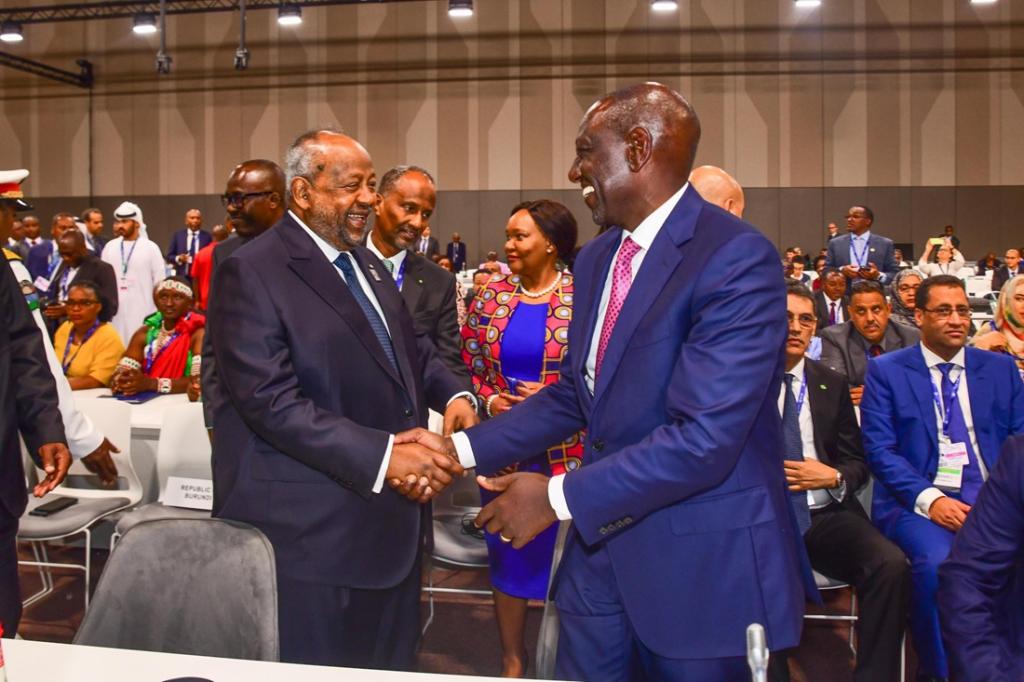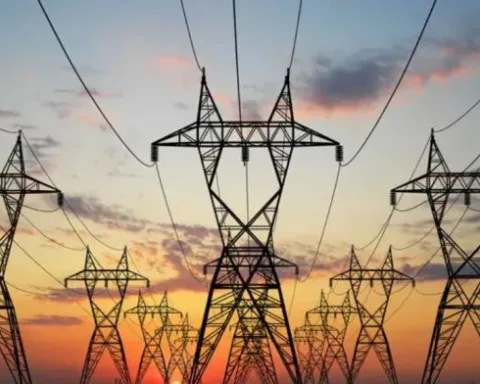On the margins of the 28th edition of the Conference of Parties (COP28), African leaders converged to launch the Africa Green Industrialization Initiative (AGII) towards accelerating and scaling green industries and businesses across the continent, promoting climate mitigation and adaptation as well as stimulating economic green growth in Africa. This happened at an event attended by leaders of Angola, Burundi, Djibouti, Ghana, Cote d’Ivoire, Mauritania, Nigeria, Senegal and Zambia as well as COP28 President Sultan Ahmed Al Jaber. Also present were the President of the United Arab Emirates, Sheikh Mohamed bin Zayed al Nahyan and the UN Climate Change High-Level Champion for Egypt, Mahmoud Mohieldin.
After deliberating on plans to activate end-to-end socio-economic transformation through the rapid growth of green industrial clusters, the strong role of regional and global export markets for value-added green products and technologies, AGII emerged as the pathway for African nations’ development. The private sector-driven initiative seeks to unlock businesses worth trillions of US dollars in agriculture, the blue economy and climate-smart technologies. It comes as a refreshing sequel to the September 6 Nairobi Declaration where African countries committed to facilitating the launch of green industries to reduce carbon emissions as well as getting the international community to stop seeing the continent as a victim but a long-ignored ally in the fight against global warming.
Join our WhatsApp ChannelThe Declaration, which according to the Head of the African Union Commission, Moussa Faki Mahamat was “adopted unanimously”, asserted that “Africa possesses both the potential and the ambition to be a vital component of the global solution to climate change”. For all its vaunting ambitions, AGII is therefore a walk of the talk particularly as it is coming barely three months later. Over the past decade, Africa only attracted 2 per cent of global spending on renewables yet the continent requires a “tenfold increase in the finance capital flowing” into renewables over the next seven years. Some $600 billion is also required to achieve the aim of boosting renewables from 56 gigawatts (GW) in 2022 to at least 300 GW by 2030.
Although contributing a mere 4 per cent of global greenhouse gas emissions, African economies have already taken a hit of between 5 and 15 per cent as a result of climate change. From extreme weather conditions to disruptions in agriculture and water resources causing deadly farmer-herder clashes. The urgency for climate action in Africa is not just an environmental concern but a matter of economic resilience and social stability. This is given that many African nations rely mostly on climate-vulnerable sectors such as energy, tourism, water and agriculture to survive and grow their economies. The continent is therefore at a critical intersection where economic development is as paramount as environmental sustainability, hence the need for their embrace of AGII.
The Economic Report on Africa published in 2016 by the United Nations Economic Commission for Africa (ECA) was explicit that “Green industrialization is the only way for Africa” and that businesses going green remains the precondition for sustainable and inclusive growth in the continent. Businesses, as key players in the African economy, therefore have a crucial role to play in this battle against climate change. A comprehensive study by the United Nations Environment Programme (UNEP), published in September affirms that Africa’s private sector can bolster its green agenda, drive increased GDP, higher income per capita, create tens of millions of jobs and foster collaboration between governments, businesses and local communities.
The report highlights that investment in agriculture and nature could increase productivity and minimize negative impacts on ecosystems, preventing food insecurity and biodiversity loss. African businesses can leverage their influence and resources to spearhead the transition towards a green economy through sustainable practices that prioritize environmental stewardship alongside economic growth. They can do this by investing in renewable energy sources, implementing energy-efficient technologies, and reducing waste are pivotal steps toward building a green economy. What the private sector needs to do is to align with AGII which is already looking at accelerating and scaling green industries and businesses across Africa towards climate mitigation and adaptation, and act as a catalyst for economic green growth on the continent.
The AGII, which incorporates elements of the Sustainable Development Goals (SDGs) and the Paris Agreement, discourages fossil fuel production and use that immensely contributes to global warming. One of the major contributors to climate change is the carbon footprint associated with supply chains. African businesses can champion sustainability by reevaluating and optimizing their supply chains. They can do this by identifying and collaborating with suppliers that adhere to environmentally responsible practices, minimizing waste, and prioritizing the use of renewable resources.
Africa must begin to look beyond fossil fuel which dump will be inevitable in the long run. This will be a tall order given that in countries like Nigeria and Angola oil and related products account for more than 90 per cent of exports and huge chunks of their national budgets. Ghana, Uganda, Liberia and Sierra Leone, which recently discovered oil, are anticipating a financial windfall from the sector. While it may be untenable or unreasonable to get these countries to abandon or limit their hydrocarbon investments for the sake of AGII, Africa can get by with the abundant solar, wind, hydro, biomass, and geothermal resources that may contribute to a 6.4 per cent increase in GDP from 2021 to 2050. Ocean renewable energy is still an untapped resource for Africa with the potential to generate between 100 to 400 per cent of current global energy demand.
This is where collaboration with the Global North is needed so that Africa can build the technological capital to pivot to renewable energy. Technology transfer initiatives and investments in education and research can empower African nations to harness the full potential of green technologies. The United Nations and green advocates have continued to preach that going green, especially relying on energy generated from the sun, wind, rain and geothermal heat that Africa has in abundance, can facilitate this capacity building for Africa. As they insist that countries should take advantage of innovations, technologies and business models that use natural resources optimally and efficiently, let them do more to make these technologies and innovations accessible to not just African governments but private sector players.
Prime Business Africa calls on the world’s wealthy polluters to follow in the footsteps of the UAE which has pledged to accelerate Africa’s switch to clean energy with $4.5 billion. At the Africa Climate Summit, President William Ruto of Kenya disclosed that a tally of funding pledges for the continent had reached $23 billion. We hope that these pledges will be redeemed now that the continent has shown great resolve to go green. As these donations come, leaders and private sector operators in the continent must ensure judicious use of them. Let them by their commitment prove wrong COP28 President Sultan Ahmed Al Jaber who said “Africa’s biggest challenge is not in the scarcity of resources but in the scarcity of action”. In light of UNEP’s submission that “restoring nature can unlock a business value of $10 trillion and create 395 million jobs by 2030 (in Africa)”, it is therefore in the continent’s enlightened self-interest to make the AGII work!
















![Gender Activism An Economic Necessity In Africa [PBA Editorial]](https://www.primebusiness.africa/wp-content/uploads/2023/11/vaw-720x480.png)


Follow Us